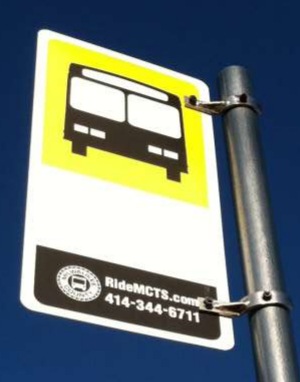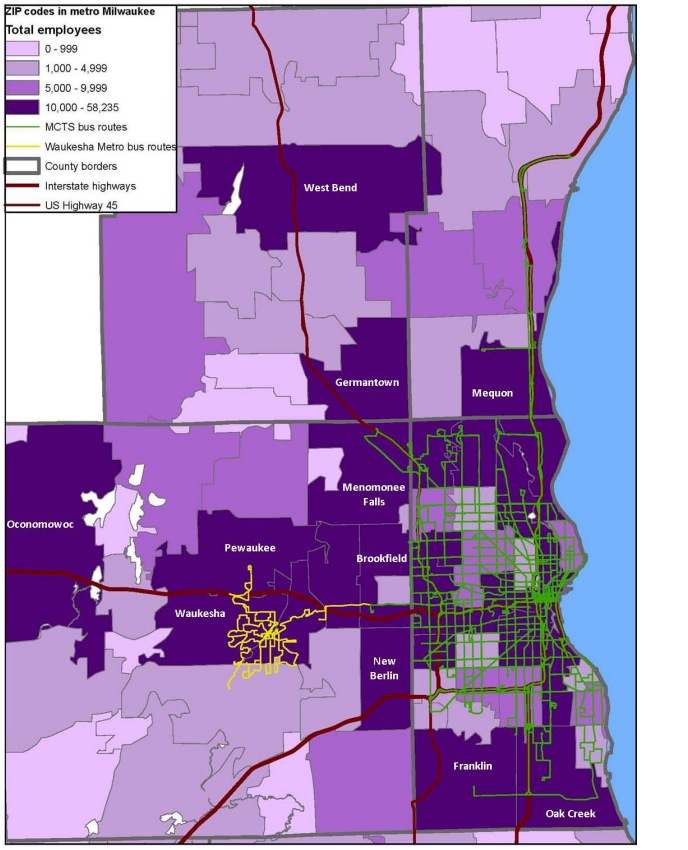PUBLIC POLICY FORUM
Introduction
 In recent years, the divergence between where workers live in the Milwaukee area and where jobs are located – also known as the “spatial mismatch” – has been well documented, particularly in the context of declining public transportation services in the region. It is difficult or impossible to get to jobs in many suburban areas without an automobile, a problem that has been exacerbated over the past decade as the severe fiscal challenges facing the Milwaukee County Transit System (MCTS) have produced a series of cuts in service. In fact, those cuts have resulted in a 22% decline in total annual bus miles between 2000 and 2012 and have caused tens of thousands of jobs to become inaccessible via public transportation.
In recent years, the divergence between where workers live in the Milwaukee area and where jobs are located – also known as the “spatial mismatch” – has been well documented, particularly in the context of declining public transportation services in the region. It is difficult or impossible to get to jobs in many suburban areas without an automobile, a problem that has been exacerbated over the past decade as the severe fiscal challenges facing the Milwaukee County Transit System (MCTS) have produced a series of cuts in service. In fact, those cuts have resulted in a 22% decline in total annual bus miles between 2000 and 2012 and have caused tens of thousands of jobs to become inaccessible via public transportation.
This report takes a fresh look at workforce mobility in metro Milwaukee by reconsidering the options that may exist to improve access to suburban job centers for those who cannot afford an automobile, or who otherwise cannot or opt not to use one. Our focus is on the four-county Milwaukee metropolitan statistical area, defined as Milwaukee, Ozaukee, Waukesha, and Washington counties. In exploring this topic, we acknowledge that the relocation of jobs to Milwaukee’s suburbs that has occurred during the past several decades is problematic on many levels, and that an ideal solution would be to encourage job growth in areas that already are well-served by transit. That is a long-term solution, however, and in the meantime there is merit in re-exploring potential transportation strategies that will better connect those seeking employment with areas where jobs currently are available.
The report begins by examining and identifying suburban Milwaukee job centers that might benefit most from improved transportation access. Transportation accessibility is discussed in terms of both the reach of current bus routes and the scope of alternative transportation services.
The report next examines how new bus routes are developed – including the many operational, financial, and political considerations that factor into route planning – and models a few new suburban bus routes to illustrate potential costs, obstacles, and benefits. We also look at how alternative transportation services are managed and financed and their potential for expansion.
With MCTS struggling to maintain existing bus services – and federal and state funding for public transit and other employment-focused transportation services in the Milwaukee area down from previous years – improving access for workers who depend upon or choose transit to get to suburban jobs in the region is no easy task. We hope this report will help policymakers as they deliberate potential ways of doing so.
Figure 1: Job centers and public transit services in the Milwaukee metro area
Download full version (PDF): Getting to Work
About the Public Policy Forum
publicpolicyforum.org
Milwaukee-based Public Policy Forum – which was established in 1913 as a local government watchdog – is a nonpartisan, nonprofit organization dedicated to enhancing the effectiveness of government and the development of southeastern Wisconsin through objective research of regional public policy issues.
Tags: Milwaukee, Public Policy Forum, WI, Wisconsin







 RSS Feed
RSS Feed